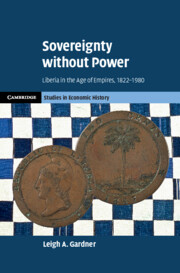Book contents
- Sovereignty without Power
- Cambridge Studies in Economic History
- Sovereignty without Power
- Copyright page
- Dedication
- Contents
- Figures
- Maps
- Tables
- Preface
- Acknowledgments
- 1 Reconstructing the Fragments
- Part I Foundations
- Part II The Art of Survival
- Part III Sovereignty for Sale?
- 8 An African Marshall Plan
- 9 Concessions and Growth
- 10 Selling the Flag
- 11 Sovereignty beyond the Age of Empires
- Book part
- References
- Index
10 - Selling the Flag
from Part III - Sovereignty for Sale?
Published online by Cambridge University Press: 27 October 2022
- Sovereignty without Power
- Cambridge Studies in Economic History
- Sovereignty without Power
- Copyright page
- Dedication
- Contents
- Figures
- Maps
- Tables
- Preface
- Acknowledgments
- 1 Reconstructing the Fragments
- Part I Foundations
- Part II The Art of Survival
- Part III Sovereignty for Sale?
- 8 An African Marshall Plan
- 9 Concessions and Growth
- 10 Selling the Flag
- 11 Sovereignty beyond the Age of Empires
- Book part
- References
- Index
Summary
During the second half of the twentieth century, the collapse of European Empires increased the number of sovereign states. At the same time, higher taxation and more aggressive regulations by governments of wealthy countries left companies and wealthy individuals seeking offshore homes for capital. In 1948, the Liberian government passed legislation to bring it into this market for offshore services, creating a new channel by which to monetize its sovereignty. The three laws passed in that year established the Liberian shipping registry and created loose corporation and tax laws intending to attract foreign investment.This chapter examines the success of the Liberian shipping registry, which by the 1960s was the largest in the world in terms of tonnage and remained one of the largest in the world even through the collapse of the Liberian state during the civil wars. It contrasts this with the failure of Liberia’s efforts to become a tax haven. This contrast allows for a broader exploration of the "market" for sovereignty and its limits since the middle of the twentieth century. It shows that while, in theory, any state with formal recognition might try to attract capital by committing to lower levels of regulation, this commitment alone is not enough to generate investment and economic development.
Information
- Type
- Chapter
- Information
- Sovereignty without PowerLiberia in the Age of Empires, 1822–1980, pp. 246 - 270Publisher: Cambridge University PressPrint publication year: 2022
